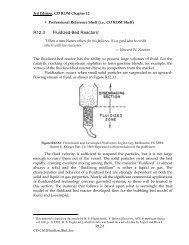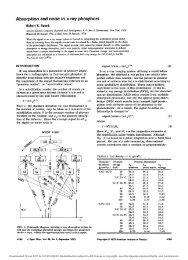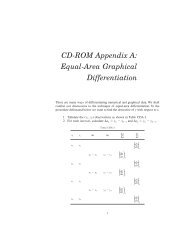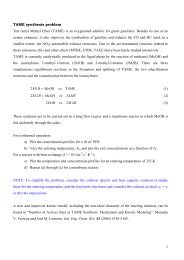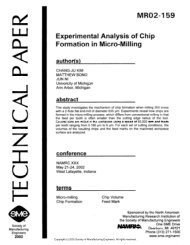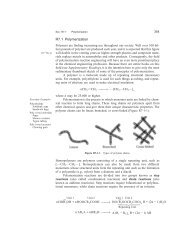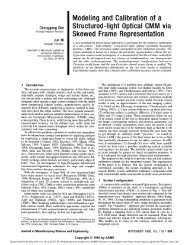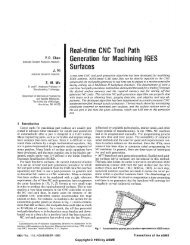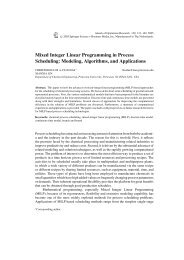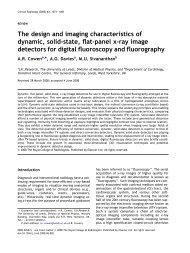Conceptual framework: What do you think is going on?
Conceptual framework: What do you think is going on?
Conceptual framework: What do you think is going on?
You also want an ePaper? Increase the reach of your titles
YUMPU automatically turns print PDFs into web optimized ePapers that Google loves.
03-Maxwell.qxd 10/1/2004 3:13 PM Page 50<br />
50 QUALITATIVE RESEARCH DESIGN<br />
high ec<strong>on</strong>omic<br />
value of<br />
women’s work<br />
b<str<strong>on</strong>g>is</str<strong>on</strong>g><strong>on</strong> hide<br />
hunting<br />
widespread<br />
polygyny<br />
relative age<br />
more important<br />
than generati<strong>on</strong><br />
involvement<br />
in fur trade<br />
increased and<br />
unequal wealth<br />
large age d<str<strong>on</strong>g>is</str<strong>on</strong>g>parity<br />
am<strong>on</strong>g brothers<br />
extensi<strong>on</strong> of<br />
brother terms to<br />
same-age relatives<br />
in other generati<strong>on</strong>s<br />
acqu<str<strong>on</strong>g>is</str<strong>on</strong>g>iti<strong>on</strong><br />
of guns<br />
expansi<strong>on</strong><br />
westward<br />
high importance<br />
of male solidarity<br />
substituti<strong>on</strong> of comrade<br />
term for brother term in<br />
close relati<strong>on</strong>ships<br />
Figure 3.3 Causes of Changes in Blackfeet Kin Terminology<br />
pressure<br />
from Cree<br />
widespread warfare<br />
with other tribes<br />
extensi<strong>on</strong> of<br />
brother terms to<br />
other relatives in<br />
own generati<strong>on</strong><br />
Th<str<strong>on</strong>g>is</str<strong>on</strong>g> map d<str<strong>on</strong>g>is</str<strong>on</strong>g>plays some of the events and influences leading to the<br />
widespread use of “brother” terms in Blackfeet society by the late 1800s. More<br />
than any other Plains tribe, the Blackfeet were involved in the fur trade. Th<str<strong>on</strong>g>is</str<strong>on</strong>g><br />
led to increased wealth (including guns), a greater value of women’s work in<br />
preparing b<str<strong>on</strong>g>is</str<strong>on</strong>g><strong>on</strong> hides for trade, a highly unequal d<str<strong>on</strong>g>is</str<strong>on</strong>g>tributi<strong>on</strong> of wealth that<br />
favored men who had many horses for b<str<strong>on</strong>g>is</str<strong>on</strong>g><strong>on</strong> hunting, and a massive increase<br />
in polygyny, as wealthy men acquired large numbers of wives to process<br />
hides. The acqu<str<strong>on</strong>g>is</str<strong>on</strong>g>iti<strong>on</strong> of guns and horses allowed the Blackfeet to move westward<br />
into the Plains, driving out the tribes that had previously lived there.<br />
The increase in warfare and b<str<strong>on</strong>g>is</str<strong>on</strong>g><strong>on</strong> hunting created a greater need for<br />
male solidarity and led to the widespread use of brother terms between men<br />
of the same generati<strong>on</strong> to enhance th<str<strong>on</strong>g>is</str<strong>on</strong>g> solidarity. However, the increased<br />
polygyny led to a wider range of ages within a man’s generati<strong>on</strong> and to the<br />
extensi<strong>on</strong> of brother terms to men of other generati<strong>on</strong>s who were of about the<br />
speaker’s age. Th<str<strong>on</strong>g>is</str<strong>on</strong>g> proliferati<strong>on</strong> of the use of brother terms eventually diluted<br />
their solidarity value, generating a new term, “comrade,” which was often used<br />
in close relati<strong>on</strong>ships between men.<br />
SOURCE: Adapted from “The Development of Plains Kinship Systems,” by J. A. Maxwell, 1971,<br />
unpubl<str<strong>on</strong>g>is</str<strong>on</strong>g>hed master’s thes<str<strong>on</strong>g>is</str<strong>on</strong>g>, University of Chicago, and “The Evoluti<strong>on</strong> of Plains Indian Kin<br />
Terminologies: A N<strong>on</strong>-reflecti<strong>on</strong><str<strong>on</strong>g>is</str<strong>on</strong>g>t Account,” by J. A. Maxwell, 1978, Plains Anthopolog<str<strong>on</strong>g>is</str<strong>on</strong>g>t, 23,<br />
13–29.




